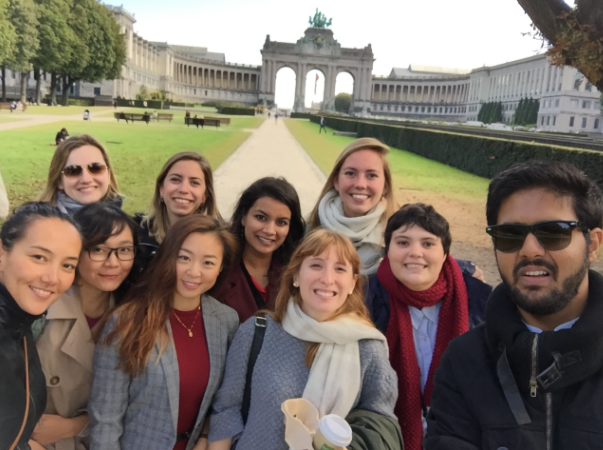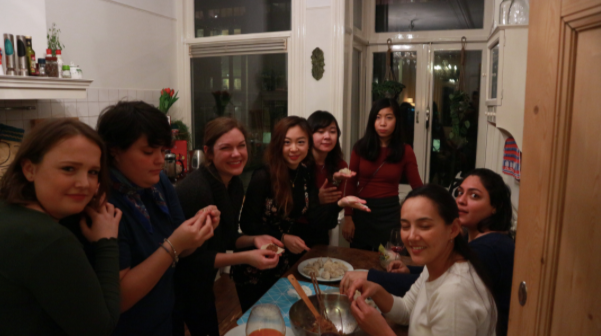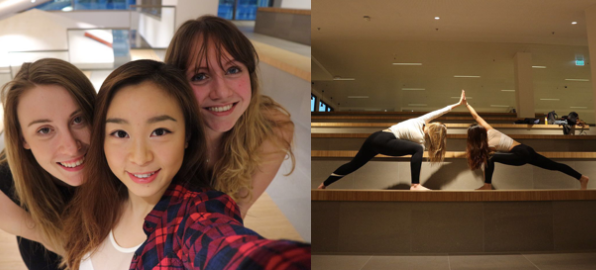Build Cultural Awareness Instead of Cultural Shock: The Struggle of a Chinese Girl Studying in Holla
- Cracker No.1 Zhu
- Apr 2, 2017
- 3 min read
Six months have already passed since I arrived at Amsterdam airport from Shanghai, China. I have already lived through the so-called “honeymoon” phase, survived in the stormy “depression” phase, and successfully entered the adjusting phase. I remember that a few months ago my British classmate asked me whether I had suffered from “cultural shock”. Now, I would like to answer this question by using “cultural awareness” instead of “shock”. In today’s blog, I will walk you through the cultural awareness I have built during my study experience.
Participating in Class
On the very first day of school, I was indeed shocked by the actively spontaneous speaking in class. Once there was a question proposed by the professor, all my European classmates would strive to be the first one to answer. Sometimes, they even interrupted the teacher with their doubts. While in the eastern world, students grow up in the teacher-oriented classroom where they tend to listen more instead of speaking or expressing their own ideas. And interrupting teachers when they are speaking is considered to be extremely disrespectful, which only rude students do.

(Photo: Academic Trip to Brussels)
Competences: Assertiveness VS Listening
Another interesting phenomenon which I have noticed happened in the international negotiation class. During this practical class, all the students were required to fill in different kinds of surveys to figure out their own necessary competencies to develop. Basically, all the Asian students, including me, are good at listening and empathizing which are coincidentally what most of my western classmates lack. On the other hands, my European classmates’ capability of being assertive is what Asian students need to learn.

What Causes Different Behaviour Patterns?
It makes me question the different education systems we are in. In eastern world, students grow up in the teacher-oriented classroom where they have been practicing listening for their whole life. While in western class, it is the student-oriented atmosphere where students are encouraged to speak more and to develop their critical and creative thinking. These two totally different systems, as well as two different societies (individualism VS collectivism), have cultivated dissimilar talents whose extremely different characteristics are revealed in all aspects of daily life.

(Photo: Chinese Lunar New Year Celebration)
What Problems Are We Facing?
The Western educational system emphasizes a student-oriented environment where peer-study plays a vital role. Under this kind of atmosphere, students tend to be independent and to develop critical thinking. However, since teachers usually encourage students to speak more in class, fewer judgments are applied in this situation. The lack of enough supervising and the equal atmosphere where everyone’s opinion is important, on the one hand, it is amazing; On the other hand, distinguished behaviors are not awarded and mistakes or wrongly behaviors are barely pointed out. Since students learn from each other more, they tend to follow the “loud” or “dominant” peers instead of the truly “right” models.
While in eastern class, teachers are the souls. Students learn from listening to lectures. Thus, most of the students become the master of active listening and emphasizing during learning, while tend to be short of creative thinking. Problems occur when two kinds of students are studying in the same education system. Instead of thinking Asian students are stupid because they are not active in class, or instead of blaming western students being arrogant because they speak whatever pop up in their heads, it is time for both sides to understand each other and more importantly study from each other!

(Photo: Visiting European Parliament)
What Should We Do?
Pellegrino, a cross-cultural expert, says that only when we use curiosity to replace negativity, picking up the best parts of each culture and putting them together, we will be able to develop a truly global mindset.
Indeed, build respect and appreciation when facing differences is the key. Instead of questioning “why my classmates are so weird?”, we should rephrase my sentence to “Oh! This is how Indian/ Norwegian/ Spanish get things done”. Cultural awareness is built on understanding and empathy. Then being curiosity instead of being closed-minded. Just take a moment to appreciate the beauty of our differences! it is the difference that makes our world this colorful and diverse. Last but not least, when different cultures integrate, conflicts will happen. However, this is the time we learn to reframe challenges as opportunities for us to grow faster and stronger.

(Photo: Yoga in Leiden University's New Building in the Hague-Wijhaven)
Just as the former CEO of Google Kaifu Li says, “A true international talent is the one who possesses both the western and eastern virtues, which will be able to make a real difference in our world”.

You can also find us here! Don't forget to subscribe + comment + share. We love to hear from you!!
Youtube: Cracker TV
Instagram: lucky_piggy







Comments